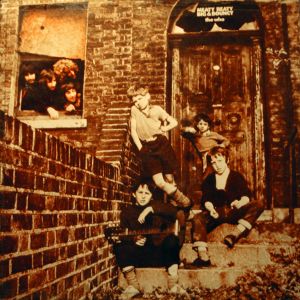
- Format: FLAC

The Who Meaty Beaty Big and Bouncy German Polydor Pressing Vinyl Rip Flac
From Wikipedia, the free encyclopedia
Meaty Beaty Big and Bouncy
Compilation album by The Who
Released 30 October 1971
Recorded 19641970
Genre Rock
Length 42:54
Language English
Label Track/Polydor
Producer Kit Lambert, Shel Talmy, The Who
Professional ratings
Review scores
Source Rating
Allmusic 5/5 stars[1]
Robert Christgau (A-)[2]
Meaty Beaty Big and Bouncy is a compilation album of singles by British rock band The Who, released in 1971 as Track 2406 006 in the UK and as Decca DL 79184 in the US. It entered the US Billboard 200 chart on 20 November 1971, peaking at #11,[3] and the UK chart on 3 December 1971, peaking at #9.[4] In 1987, Rolling Stone magazine ranked it #99 on their list of the 100 best albums of the period 19671987.
Contents
Every track on the album with the exception of "Boris the Spider", the one song written by John Entwistle, had been released as a single in the UK, with all except "A Legal Matter", "Magic Bus", and "The Seeker" being top ten hits. "Happy Jack", "I Can See for Miles", "Magic Bus", and "Pinball Wizard" had also been Top 40 hits in the US. It was compiled by Pete Townshend over objection by manager Kit Lambert, who tried to have the track order changed but failed because too many copies had already been pressed.[citation needed] The UK release was held up because The Who and Bill Curbishley had failed to clear it with Lambert.[citation needed]
The album title is referential of traits of the members of the band, Meaty: Daltrey, who was quite fit at the time, Beaty: Moon, for his drumming, Big: Entwistle, who was a large person, often referred to as "The Ox", and Bouncy: Townshend, who jumped about quite acrobatically during performances.[citation needed]
The original vinyl album featured a longer alternate studio take of "Magic Bus" in fake stereo which was not included on the original compact disc version, because the true stereo or mono source could not be found for the long version of the song.[citation needed] However, on 25 July 2007, Universal Japan re-released the album in a mini-LP sleeve that includes the long alternate version of "Magic Bus" in fake stereo, as with the original album.
Album cover and photographs
The album's original title was The Who Looks Back and the front cover was meant to illustrate thatThe Who can be seen looking at four children representing each member of the band in their childhood years.[citation needed] However, the children pictured are actually four kids rounded up in 1971 and dressed up in mid 1950s clothes in order to look like the Who's members as small boys. One of the boys is Who manager Bill Curbishley's younger brother Paul.
The panoramic photograph gracing the album's inside cover is an exterior shot of the side of the Railway Hotel, a pub that was sited on the bridge next to Harrow and Wealdstone railway station in north-west London.[citation needed] The Railway Hotel was a popular hangout for Mods and soon after Keith Moon joined the band, The Who became a regular attraction there from June 1964, performing every Tuesday night. It was here that Pete Townshend accidentally cracked his guitar's neck on the low ceiling above the stage.[citation needed] In response to laughter from the crowd, he then smashed his guitar for the first time in public; a gimmick he maintained for many years when playing live. In the album photograph, a poster advertising a 18 May performance by The Who dates from 1965; however, the photograph itself was actually taken in 1971.[citation needed]
The Railway Hotel was destroyed by fire in March 2000,[citation needed] after many years of running at a loss. The site is now occupied by four small blocks of flats, each of which is named after a member of the band.[citation needed] The cover makes a brief appearance as an in-joke / sight gag on the episode of The Simpsons that features The Who, "A Tale of Two Springfields."[citation needed]
Song notes
Several songs on the album had previously been released on long-playing album. The Who's debut My Generation included the title track, "A Legal Matter", and "The Kids Are Alright". A Quick One included "Boris the Spider" and in its American configuration "Happy Jack." "I Can See for Miles" appeared on The Who Sell Out, and "Pinball Wizard" on Tommy. "Pictures of Lily" and "Magic Bus" previously appeared on the US compilation album Magic Bus: The Who on Tour. That album features an alternate mix of the "I'm a Boy" single recording, which appeared later in abbreviated form on the Limited Edition bonus disc to the Ultimate Collection compilation. Most of the tracks on this album would also appear on many subsequent compilations of Who material.
Track listing
All songs written by Pete Townshend except where noted.
Side one
"I Can't Explain" 2:05
"The Kids Are Alright" 2:45
"Happy Jack" 2:12
"I Can See for Miles" 4:06
"Pictures of Lily" 2:43
"My Generation" 3:18
"The Seeker" 3:11
Side two
"Anyway, Anyhow, Anywhere" (Roger Daltrey, Townshend) 2:42
"Pinball Wizard" 2:59
"A Legal Matter" 2:48
"Boris the Spider" (John Entwistle) 2:28
"Magic Bus" 4:33 (vinyl, alternate take)
"Substitute" 3:49
"I'm a Boy" (extended version) 3:41
Personnel
Roger Daltrey lead vocals
John Entwistle bass guitar, French Horn, vocals
Keith Moon drums, percussion
Pete Townshend guitar, keyboards, vocals
Additional personnel
Nicky Hopkins piano on "Anyway, Anyhow, Anywhere" and "A Legal Matter"
Kit Lambert, Shel Talmy production
Bill Curbishley, Mike Shaw album design
Graham Hughes photography
Sales chart performance
Album
Year Chart Position
1971 Billboard Pop Albums 11
UK Chart Albums 9[4]
Sales certifications
Organization Level Date
RIAA U.S. Gold 17 January 1972[5]
Platinum 8 February 1993[5]
Rip Disclaimer Included